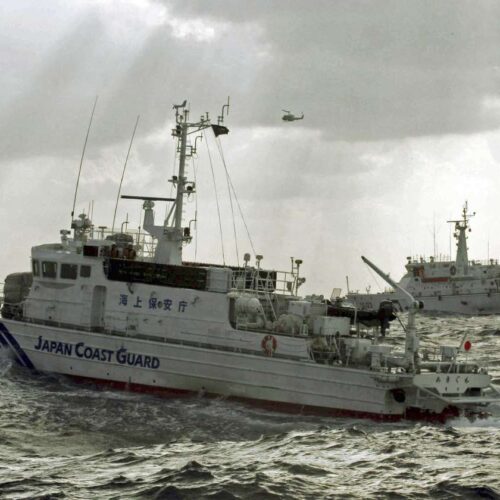Introduction
Japan, Taiwan, and China have been contesting ownership of five deserted islets and three rocks in the East China Sea since oil reserves were detected nearby more than forty years ago. But new tensions were stoked this month when the Japanese government nationalized the islands by purchasing them from a Japanese family.
This week, both Taiwan and Japan sent vessels there, prompting the Japanese to shower the rivalrous boats with water balloons launched from slingshots. Okay, not really. It wasn’t balloons that Japan fired, but the hi-tech version of a middle-schooler’s backyard weapon: a water cannon.
Although the United States transferred the islands’ post-war administration to Japan in 1971, its official position on their sovereignty now is neutral, a stance that came under question in this fun exchange at a press conference Tuesday, Sept. 25, by George Little, the acting Assistant Secretary of Defense for Public Affairs:
Q: George, U.S. forces and Japanese self-defense forces are conducting a joint exercise on Guam, simulating the defense of a small island against an unnamed aggressor. Does this have anything to do with the recent tensions between Japan and China over the Senkakus?
MR. LITTLE: This is merely an exercise, and I wouldn’t tie it in any way to island disputes…..
Q: George, having the Marines train the Japanese on how to hit the beach and take an island, how does that jibe with the overall position stated that the U.S. does not take a position in these island disputes?
MR. LITTLE: Repeat the first part of your question for me.
Q: The Marines are training Japanese how to hit the beach to take an island.
MR. LITTLE: The Japanese are our allies. We work with them on a daily basis. We have — we have bases in Japan. It’s natural for us to help the Japanese and to exercise with them. I wouldn’t construe this particular event as in any way tied to the island dispute.
Read more in National Security
Up in Arms
Who has Syria’s chemical weapons?
The secretary of defense says that Washington is not sure
National Security
Documents show Air Force neglected concerns about F-22 pilot safety
A group of AF experts that started worrying about oxygen troubles ten years ago was disbanded for lack of funding


Join the conversation
Show Comments